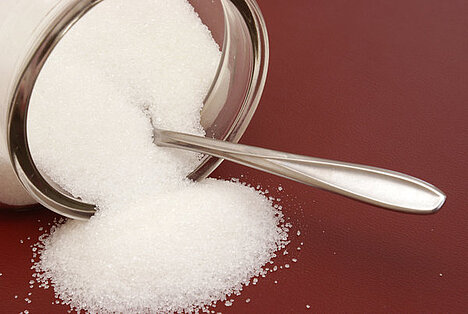Erythritol

What is erythritol?
Erythritol is a sugar alcohol that is also known as E968. It occurs naturally in some fruits, mushrooms and cheeses. It has about 70% of the sweetening power of sugar, but only 6% of the calories. It is usually made from corn or wheat. It has no effect on blood sugar or insulin levels and can therefore also be consumed by diabetics. In addition, it does not harm the teeth and can even prevent tooth decay.
Is Erythritol suitable for dogs?
Unfortunately not. Erythritol is not suitable for dogs and should be avoided at all costs. The reason for this is that dogs cannot metabolize erythritol well and it accumulates in the blood. This can lead to serious health problems such as nausea, vomiting, diarrhea, cramps or even liver failure. Symptoms can occur within minutes or hours.
How much erythritol is dangerous for dogs?
There is no exact indication of how much erythritol is dangerous for a dog. This depends on the dog's size, weight and state of health. In general, however, the more erythritol a dog eats, the worse the consequences. Therefore, you should always make sure that your dog does not have access to food or drinks that contain erythritol. Always read the ingredients list on the packaging and keep such products out of your dog's reach.
Erythritol is a low-calorie sugar alcohol that occurs naturally in some foods. It does not affect blood sugar, does not harm teeth and is safe for diabetics. However, it is toxic to dogs and can cause serious health problems. There is no exact amount that is considered dangerous, so any access to erythritol for dogs should be avoided.
If you notice any signs of hypersensitivity or poisoning in your dog, you should see your vet immediately. We are not a substitute for a vet, but we try to be as accurate as possible. Every dog reacts differently and we recommend you get a second opinion or consult your vet if in doubt.
Stay healthy and take good care of your four-legged friend!😊
Similar to Erythritol
Xylitol is safe for humans, but it can be life-threatening for dogs. Why is this the case and what should you do if your dog has eaten xylitol? In dogs, xylitol causes a strong release of insulin...
Sorbitol is a type of sugar alcohol that is chemically similar to glucose but contains an extra hydrogen atom. Sorbitol is about 60% as sweet as sugar and has more than half the calories of normal...
Stevia is an extract from the leaves of the Stevia rebaudiana plant, which is native to South America. The leaves contain steviol glycosides, which are up to 300 times sweeter than sugar but have no...
Maltitol belongs to the family of sugar alcohols (polyols), which are often used as sugar alternatives in the food industry. They offer the sweetness of sugar, but have fewer calories and do not...



